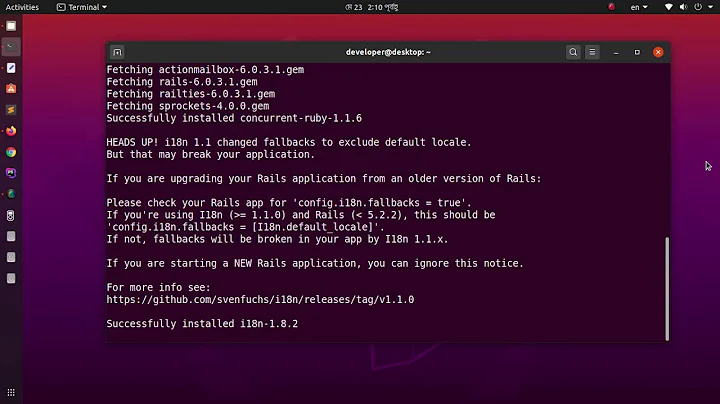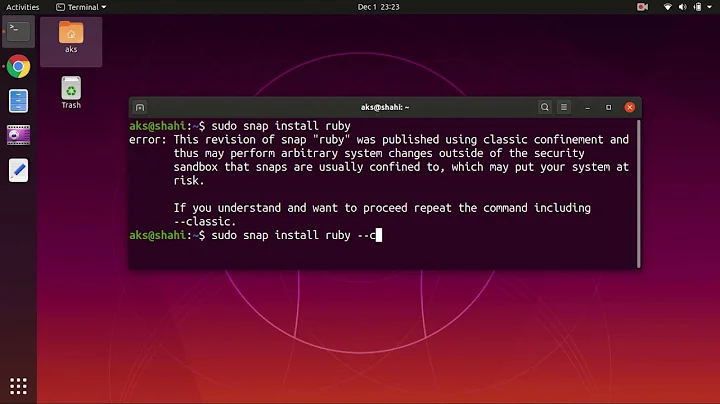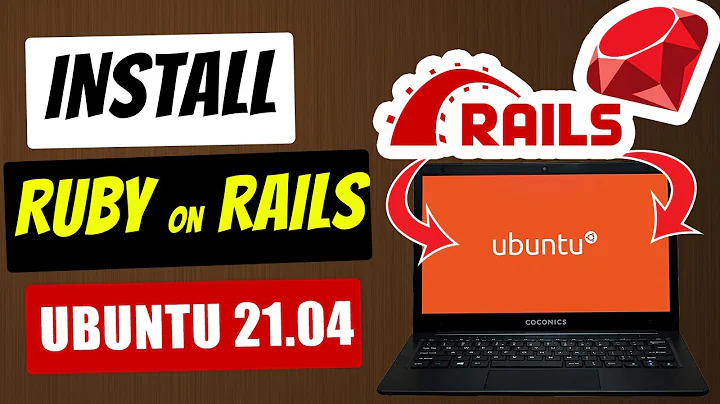How to update ruby on linux (ubuntu)?
Solution 1
sudo apt-get install ruby1.9
should do the trick.
You can find what libraries are available to install by
apt-cache search <your search term>
So I just did apt-cache search ruby | grep 9 to find it.
You'll probably need to invoke the new Ruby as ruby1.9, because Ubuntu will probably default to 1.8 if you just type ruby.
Solution 2
There's really no reason to remove ruby1-8, unless someone else knows better. Execute the commands below to install 1.9 and then link ruby to point to the new version.
sudo apt-get install ruby1-9 rubygems1-9
sudo ln -sf /usr/bin/ruby1-9 /usr/bin/ruby
Solution 3
On Ubuntu 12.04 (Precise Pangolin), I got this working with the following command:
sudo apt-get install ruby1.9.1
sudo apt-get install ruby1.9.3
Solution 4
Ruby is v2.0 now. Programs like Jekyll (and I am sure many others) require it. I just ran:
sudo apt-get install ruby2.0
check version
ruby --version
Hope that helps
Solution 5
The author of this article claims that it would be best to avoid installing Ruby from the local packet manager, but to use RVM instead.
You can easily switch between different Ruby versions:
rvm use 1.9.3
etc.
Related videos on Youtube
eKek0
I'm a software developer living in Santiago del Estero, one of the smallest towns in Argentina. I'm also a system analyst, and program in Delphi and ASP.NET with C#. Currently, I'm working in a bank developing in-house software.
Updated on February 07, 2020Comments
-
eKek0 over 4 years
I'm newbie on both ruby and linux, so I'm sure this is trivial but I don't know yet. I currently have ruby 1.8.7 installed and I want to update it to ruby 1.9. How can I do that?
-
khylo almost 12 yearsOn ubuntu 12 you need to specify v1.9.1, i.e sudo apt-get install ruby1.9.1 rubygems1.9.1
-
 Adam Miller almost 12 yearsActually, you shouldn't edit the links yourself, you should you the commands: sudo update-alternatives --config gem and sudo update-alternatives --config ruby. I suggest that this answer be edited!
Adam Miller almost 12 yearsActually, you shouldn't edit the links yourself, you should you the commands: sudo update-alternatives --config gem and sudo update-alternatives --config ruby. I suggest that this answer be edited! -
 Ben Walding about 11 yearsIf you don't need multiple versions (e.g. a production machine) then it's best to avoid RVM and just use ruby-build.
Ben Walding about 11 yearsIf you don't need multiple versions (e.g. a production machine) then it's best to avoid RVM and just use ruby-build. -
logan about 11 yearsYou could also update ruby to point to ruby 1.9. Check out stackoverflow.com/questions/1892877
-
Konrad Reiche over 10 yearsAfter a year of Ruby I must say RVM was the best choice I could have made. On Christmas 2013 I updated to Ruby 2.1 seamlessly. It is really a well-crafted tool
-
xji over 8 years@AdamMiller
update-alternativesshows "no alternative for ruby"? -
 Adam Miller over 8 yearsThis comment I made is ages old, and is no longer relevant due to changes made in the repositories.
Adam Miller over 8 yearsThis comment I made is ages old, and is no longer relevant due to changes made in the repositories. -
steenslag over 8 yearsRuby is v2.3 now. Ruby 2.0 maintenance ends 16 February 2016.
-
Mincong Huang about 8 yearsE: Unable to locate package ruby2.3 @steenslag
-
steenslag about 8 years@MincongHuang I think Debian's (and Ubuntu) default Ruby version is now 2.1 (wiki.debian.org/Ruby); with rvm you don't have to wait for the package managers.
-
 Zoe stands with Ukraine about 5 yearsRaspbian: tried one other manager before using RVM (mainly because I couldn't find the source code for RVM and the copyright on the website made it look like the project look dead). The other one failed to compile stuff, so I gave rvm a second try , and it worked a lot better. It also installed some of the missing packages I needed for the compilation. Works like a charm on distros without a decently updated apt repo
Zoe stands with Ukraine about 5 yearsRaspbian: tried one other manager before using RVM (mainly because I couldn't find the source code for RVM and the copyright on the website made it look like the project look dead). The other one failed to compile stuff, so I gave rvm a second try , and it worked a lot better. It also installed some of the missing packages I needed for the compilation. Works like a charm on distros without a decently updated apt repo







